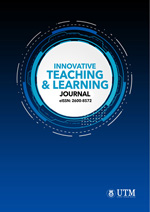Evaluating Digital Communication Skills and Attitudes Toward Online Learning Among Students in the Faculty of Engineering & Built Environment, Universiti Kebangsaan Malaysia
DOI:
https://doi.org/10.11113/itlj.v9.172Keywords:
Digital communication, Digital skills, Engineering education, Online learning, Soft skillsAbstract
As universities increasingly adopt online learning, digital communication skills have become vital for effective learning. This is especially true in technology fields such as engineering, where precise communication ensures technical accuracy. Concurrently, online learning poses unique challenges for engineering students, whose education conventionally relies on hands-on laboratory work and face-to-face interactions. Despite this, there are limited studies on engineering students’ digital communication skills and their receptiveness of online learning. This study examines the digital communication abilities of first-year engineering students at Universiti Kebangsaan Malaysia in online learning environments. The self-administered survey assessed key aspects, including engagement, adaptability, interpersonal awareness, and English proficiency. Cronbach's alpha was used to assess the internal consistency and reliability of the 33-item instrument. With an overall reliability score of 0.9261, the instrument demonstrated good reliability. A total of 121 responses were received out of 133 registered students, yielding a response rate of 90.9%. The findings reveal no strong overall preference for online learning, with face-to-face settings remain preferred for classes and group discussions. Alarmingly, engagement during online classes was moderate, with only 45.4% feeling engaged, suggesting indifference or disconnection for many. In online classes, students excelled in basic communication tasks, such as following instructions (78.5%) and asking questions (66.9%), but only 43.8% felt confident leading online discussions. They excelled in interpersonal awareness, with 63.6% attentive to others in online discussions and 59.5% empathizing with others' emotions. However, only 42.2% were confident resolving conflicts through digital communication. English proficiency emerged as a concern, with 43.0% struggling to articulate ideas as intended in online conversations. These findings highlight the need for further research into digital communication challenges and strategies to improve students' competencies.

















